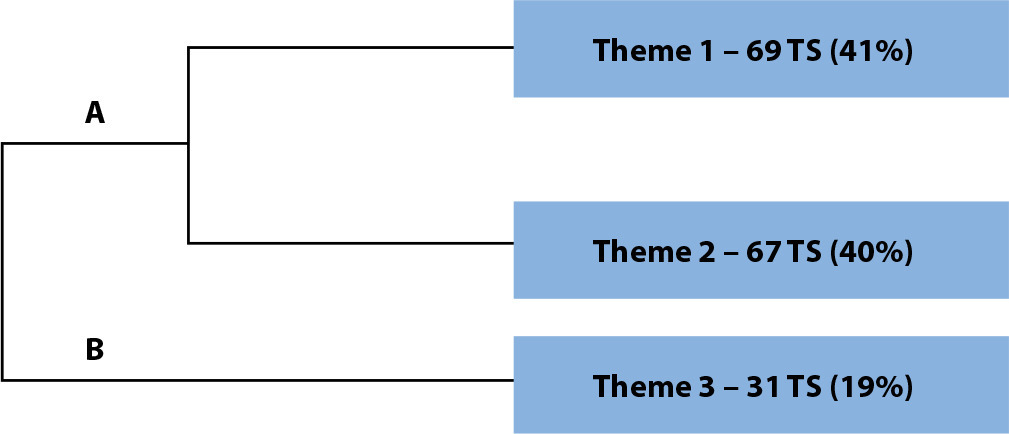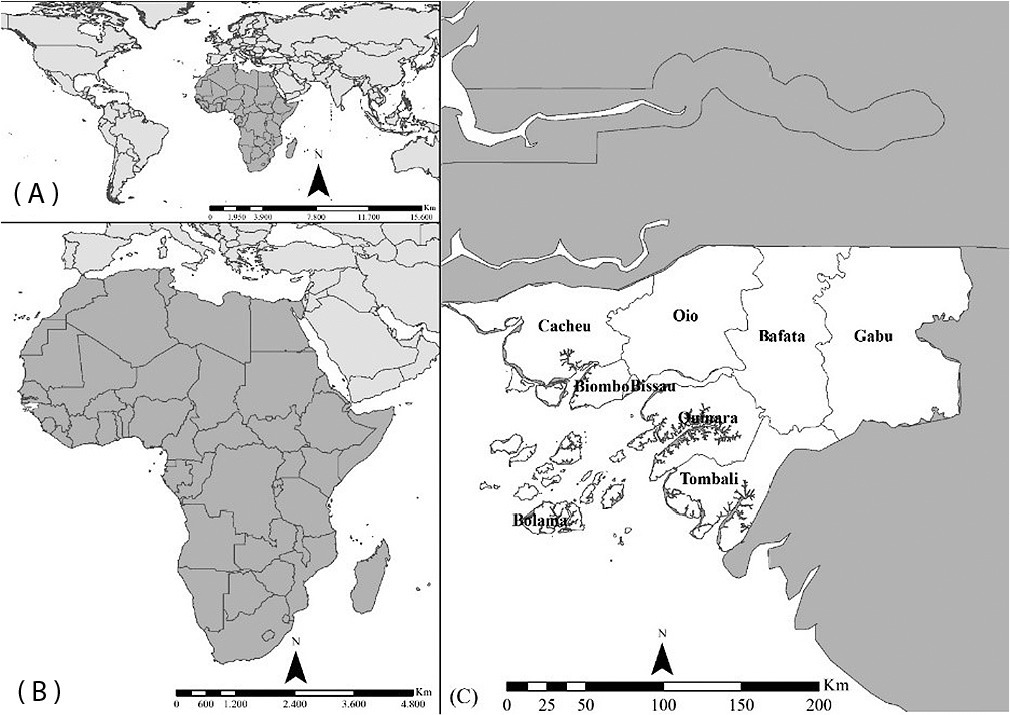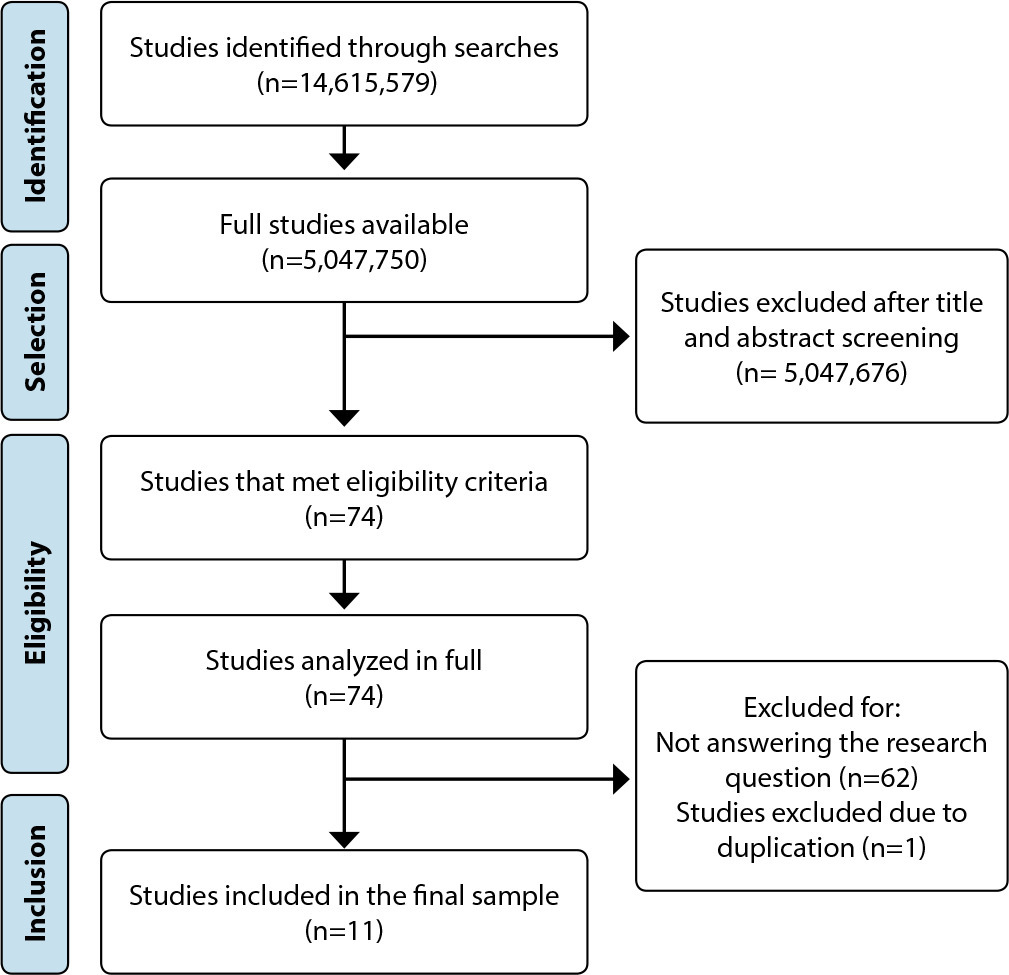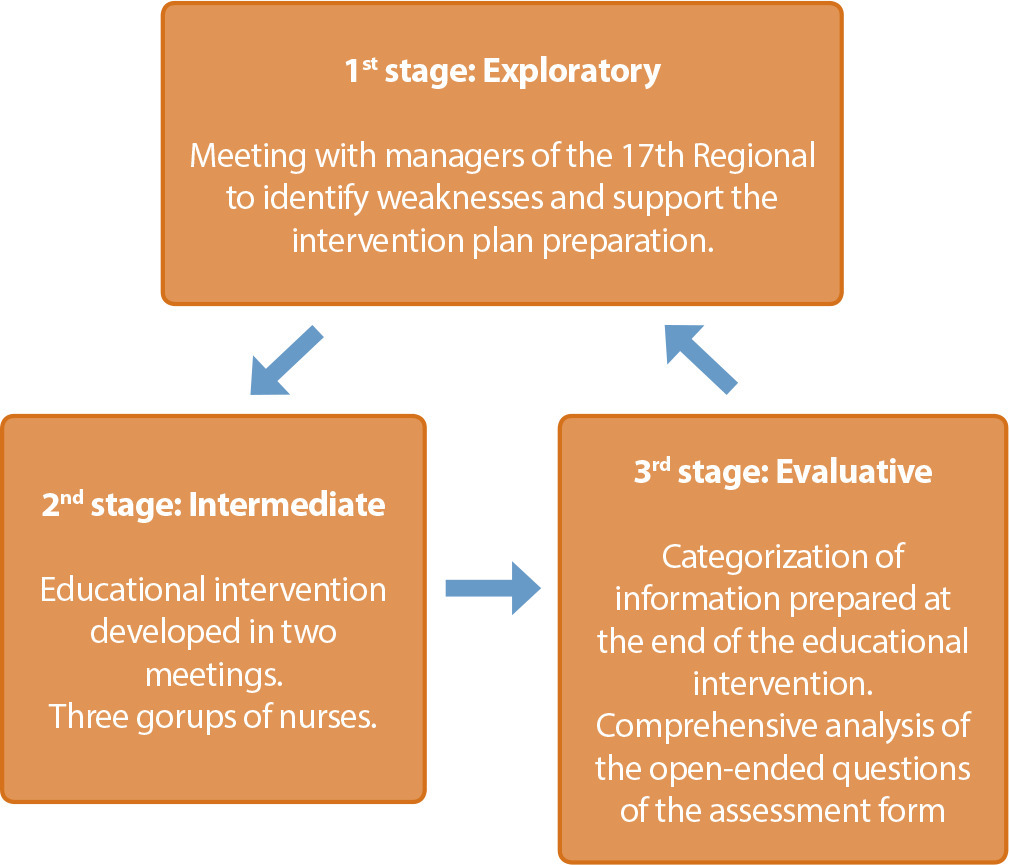-
ORIGINAL ARTICLE10-09-2023
Construction and validation of a scenario for recognizing sepsis by nursing students: a methodological study
Revista Brasileira de Enfermagem. 2023;76(4):e20220537
Abstract
ORIGINAL ARTICLEConstruction and validation of a scenario for recognizing sepsis by nursing students: a methodological study
Revista Brasileira de Enfermagem. 2023;76(4):e20220537
DOI 10.1590/0034-7167-2022-0537
Views0See moreABSTRACT
Objective:
To build and validate a clinical simulation scenario for teaching Nursing students about early recognition of signs and symptoms of sepsis in the context of the emergency unit.
Methods:
Methodological study developed in two phases: construction of a simulated scenario and content validation by expert judges. For data analysis, the Content Validity Index (CVI) was calculated considering agreement equal to or greater than 80%. The minimum acceptable CVI value for scenario validation was 1.0.
Results:
The simulation scenario proved to be appropriate, with a global Content Validity Index equal to 1. Some adjustments related to the clarity of the wording were necessary, as suggested by the judges. Conclusions: A medium-complexity, high-fidelity scenario was successfully constructed and validated for teaching early recognition of sepsis signs and symptoms.
-
EXPERIENCE REPORT10-09-2023
Service organization protocol for coping with undergraduate students’ psychological distress: a collective construction
Revista Brasileira de Enfermagem. 2023;76(4):e20220535
Abstract
EXPERIENCE REPORTService organization protocol for coping with undergraduate students’ psychological distress: a collective construction
Revista Brasileira de Enfermagem. 2023;76(4):e20220535
DOI 10.1590/0034-7167-2022-0535
Views0See moreABSTRACT
Objective:
to report on the experience of the elaboration process of a service organization protocol for coping with public undergraduate students’ psychological distress in the countryside of São Paulo.
Method:
experience report on protocol production, an action research product, carried out according to the health care and service organization protocol model, made possible by remote meetings with 33 professionals linked to the management and services of the university’s health and social assistance departments.
Results:
collective protocol production provided an opportunity for an institutional agreement on educational, therapeutic and support actions, to be developed in groups or individually with students, with provision for permanent education with civil servants.
Final considerations:
this experience made it possible to list specific actions to face undergraduate students’ psychological distress, bringing health professionals closer to those in management, promoting the exchange of concepts and practices to re-signify and transform the work developed.
-
ORIGINAL ARTICLE10-09-2023
Performance of Family Health Strategy Nurses in LGBT+ Healthcare
Revista Brasileira de Enfermagem. 2023;76(4):e20220514
Abstract
ORIGINAL ARTICLEPerformance of Family Health Strategy Nurses in LGBT+ Healthcare
Revista Brasileira de Enfermagem. 2023;76(4):e20220514
DOI 10.1590/0034-7167-2022-0514
Views0See moreABSTRACT
Objective:
To analyze the role of Family Health Strategy (FHS) nurses in the health care of LGBT+ individuals.
Methods:
This qualitative study is based on Institutional Analysis. Data was collected in August 2021 through semi-structured interviews with 14 Family Health Strategy nurses from municipalities in the state of São Paulo. The data was processed using the IRaMuTeQ® software and analyzed lexically.
Results:
The textual corpus gave rise to three themes, which addressed the nurses’ practice, the difficulties and challenges they face in providing care to LGBT+ individuals, and the direct association of LGBT+ individuals with sexually transmitted infections.
Conclusion:
Lack of preparedness, access to information, and the need for expanded listening skills are still gaps in the performance of FHS nurses in caring for LGBT+ individuals. However, fostering acceptance and building strong relationships have been effective strategies in bridging the gap in nursing care for the LGBT+ community.

-
ORIGINAL ARTICLE10-09-2023
Perceived stress by mototaxi drivers and its relationship with sociodemographic and occupational characteristics
Revista Brasileira de Enfermagem. 2023;76(4):e20220505
Abstract
ORIGINAL ARTICLEPerceived stress by mototaxi drivers and its relationship with sociodemographic and occupational characteristics
Revista Brasileira de Enfermagem. 2023;76(4):e20220505
DOI 10.1590/0034-7167-2022-0505
Views0See moreABSTRACT
Objective:
To investigate the association of sociodemographic and occupational characteristics with a high level of perceived stress in motorcycle taxi drivers.
Method:
Cross-sectional study carried out with motorcycle taxi drivers who answered instruments on sociodemographic and occupational variables – Perceived Stress Scale, Job Content Questionnaire and Effort-Reward Imbalance. Descriptive statistics, Pearson’s chi-square test and Poisson regression with robust variance were used. Statistical significance was 5%.
Results:
Of the 800 motorcycle taxi drivers, 46.8% had a high level of perceived stress. In the multivariate analysis, a high level of stress was associated with low control over work (PR=7.76; 95%CI=5.19-11.61), low social support at work (PR=3.87; 95%CI =2.95 5.08), working hours longer than eight hours a day (RP=1.47; 95%CI=1.21-1.78) and monthly income less than or equal to two minimum wages (PR=1.34;95%CI=1.13-2.58).
Conclusion:
Long working hours, occupational stressors and low income were associated with a high level of perceived stress. Public policies and interventions to minimize occupational stressors are essential.
-
ORIGINAL ARTICLE10-09-2023
Spatial and temporal analysis of tuberculosis incidence in Guinea-Bissau, 2018 to 2020
Revista Brasileira de Enfermagem. 2023;76(4):e20220481
Abstract
ORIGINAL ARTICLESpatial and temporal analysis of tuberculosis incidence in Guinea-Bissau, 2018 to 2020
Revista Brasileira de Enfermagem. 2023;76(4):e20220481
DOI 10.1590/0034-7167-2022-0481
Views0See moreABSTRACT
Objective:
to analyze the epidemiological profile, spatial and temporal distribution of tuberculosis in Guinea-Bissau from 2018 to 2020.
Methods:
an ecological study, carried out in Guinea-Bissau, considering new cases of tuberculosis. Spatial analysis of areas was used to verify tuberculosis distribution in the country, and time series were used to identify incidence evolution over the years of study.
Results:
a total of 6,840 new cases of tuberculosis were reported. Tuberculosis incidence rate in the country ranged from 36.8 to 267.7 cases/100,000 inhabitants, with emphasis on the regions of Bissau and Biombo (over 90 cases/100,000). By using time series, it was possible to observe an increase in case incidence over the years of study.
Conclusions:
the study made it possible to identify the epidemiological profile of tuberculosis in Guinea-Bissau, spatial distribution heterogeneity, in addition to identifying the disease evolution over the years of investigation.

-
ORIGINAL ARTICLE10-09-2023
Eating habits: what foods do children between 12 and 36 months consume?
Revista Brasileira de Enfermagem. 2023;76(4):e20220393
Abstract
ORIGINAL ARTICLEEating habits: what foods do children between 12 and 36 months consume?
Revista Brasileira de Enfermagem. 2023;76(4):e20220393
DOI 10.1590/0034-7167-2022-0393
Views0See moreABSTRACT
Objective:
to identify toddlers’ eating habits.
Method:
a cross-sectional study of quantitative analysis, with a sample of 808 toddlers who attended day care centers in the district of Viseu, Portugal, between November 2018 and September 2019. Data were collected using a questionnaire directed at parents.
Results:
the prevalence of children who ate six meals a day was 42.8%, and 42.5%, those who ate five meals. It was found that 2.0% of children consumed chocolates, 1.0%, desserts, and 0.4%, carbonated beverages, daily. On average, dairy product (M=5.61; SD=2.62) and meat/fish/egg (M=4.80; SD=3.57) consumption was higher than recommended, while fat (M=0.48; SD=0.40), legume (M=0.49; SD=0.45), vegetable (M=1.18; SD=0.87) and water (M=0 .51; SD=0.29) consumption was lower.
Conclusions:
there was a higher or lower consumption than recommended for some foods, highlighting the need to implement nursing intervention programs aimed at promoting healthy eating habits in toddlers and families.
-
REVIEW10-09-2023
Self-care guidelines for patients in the post-hematopoietic stem cell transplantation period: a scoping review
Revista Brasileira de Enfermagem. 2023;76(4):e20220383
Abstract
REVIEWSelf-care guidelines for patients in the post-hematopoietic stem cell transplantation period: a scoping review
Revista Brasileira de Enfermagem. 2023;76(4):e20220383
DOI 10.1590/0034-7167-2022-0383
Views0ABSTRACT
Objective:
To map the evidence on self-care guidelines for patients in the post-hematopoietic stem cell transplantation (HSCT) period.
Method:
Scoping review supported by Joanna Briggs Institute recommendations, with searches conducted between March and April 2022 in national and international databases and repositories of theses and dissertations.
Results:
Of the 11 studies that composed the final sample, the guidelines had a social and personal aspect, as post-transplant patients need to follow numerous essential recommendations for the prevention of infections and complications for successful treatment and improved quality of life.
Conclusion:
Knowing the self-care guidelines that must be performed by post-HSCT patients is fundamental for the nursing team to provide the necessary information for care outside the controlled environment of the hospital, in addition to minimizing episodes of infection, death, and increasing the survival and quality of life of transplant recipients.
Keywords:Health EducationHematopoietic Stem Cell TransplantationNursing CarePatient Discharge SummariesSelf-CareSee more
-
ERRATUM01-01-2016
ERRATUM
Revista Brasileira de Enfermagem. 2016;69(5):1002-1002
Abstract
ERRATUMERRATUM
Revista Brasileira de Enfermagem. 2016;69(5):1002-1002
DOI 10.1590/0034-7167.20166905e01
Views0Article “Alcohol and alcoholism: attitudes of nursing students”, with number of DOI: http://dx.doi.org/10.1590/S0034-71672013000100013, published in the journal Revista Brasileira de Enfermagem, v66(1):84-9, page 89 that read:“18. Miranda SP, Vargas D. Satisfação de pacientes de um centro de atenção Psicossocial álcool e drogas com o atendimento do enfermeiro. SMAD, Rev Eletrônica Saúde Mental Alcool Drog 2019;5(2):1-15”.[…]See more -
REVIEW01-01-2016
Research methodology for nursing and health: a book review
Revista Brasileira de Enfermagem. 2016;69(5):1000-1001
Abstract
REVIEWResearch methodology for nursing and health: a book review
Revista Brasileira de Enfermagem. 2016;69(5):1000-1001
DOI 10.1590/0034-7167-2015-0135
Views1For those interested in nursing and health, the book entitled “Research methodology for nursing and health: from theory to practice”() was released in October 2015, at the 67th Brazilian Congress of Nursing, sponsored by National ABEn. The interest emerged from two organizers: Dr. Maria Ribeiro Lacerda (UFPR) and Dr. Regina Gema Santini Costerano (UNIFRA). Forty-seven […]See more -
REFLECTION01-01-2016
Violence in the workplace in Nursing: consequences overview
Revista Brasileira de Enfermagem. 2016;69(5):996-999
Abstract
REFLECTIONViolence in the workplace in Nursing: consequences overview
Revista Brasileira de Enfermagem. 2016;69(5):996-999
DOI 10.1590/0034-7167-2015-0133
Views0See moreABSTRACT
Objective:
to reflect on the consequences of workplace violence experienced by nursing professionals.
Methods:
this is a reflection paper based on recent publications related to the subject, particularly researches carried out in Brazil and in other countries.
Results:
exposure to workplace violence has been associated with health problems in nursing professionals, which may be physical damage, emotional manifestations, and psychic disorders. It also affects the employee performance, his or her family and social interactions.
Conclusion:
this phenomenon is potentially noxious and costly, for it leads to suffering, illness, absence from work, and even death. This reflection calls attention moreover to the importance of a safe and adequate health care work environment.
-
REFLECTION01-01-2016
Construcción de la enfermera de práctica avanzada en Catalunya (España)
Revista Brasileira de Enfermagem. 2016;69(5):991-995
Abstract
REFLECTIONConstrucción de la enfermera de práctica avanzada en Catalunya (España)
Revista Brasileira de Enfermagem. 2016;69(5):991-995
DOI 10.1590/0034-7167.2016690507
Views0RESUMEN
El desarrollo de la enfermera de práctica avanzada (EPA) ha supuesto un reto para las enfermeras en países como EE.UU., Canadá, Gran Bretaña y Australia, entre otros, y desde hace escasos años está siendo considerada en Catalunya y España como un sistema para desarrollar nuevos roles que aporten eficacia y eficiencia al sistema sanitario. El presente artículo pretende conceptualizar la EPA y los modelos de referencia así como contextualizar y reflexionar sobre la EPA en Catalunya, desde el punto de vista de formación y de la implantación de los denominados nuevos roles de enfermería, asimilándolos a la práctica avanzada.
Keywords:Competencia ClínicaEnfermeríaEnfermería de Práctica AvanzadaPráctica ProfesionalRol de la EnfermeraSee more -
REFLECTION01-01-2016
Developing the Advanced Practice Nurse in Catalonia
Revista Brasileira de Enfermagem. 2016;69(5):991-995
Abstract
REFLECTIONDeveloping the Advanced Practice Nurse in Catalonia
Revista Brasileira de Enfermagem. 2016;69(5):991-995
DOI 10.1590/0034-7167.2016690507
Views0See moreABSTRACT
The development of advanced practice nurses (APN) has proved a challenge for nurses in countries such as the USA, Canada, Great Britain, and Australia among others. It is only in recent years that the system has been considered in Catalonia and Spain as a way to develop new roles to bring effectiveness and efficiency to the health system. From the standpoint of training and implementation of the above-mentioned new nursing roles, the following article aims to conceptualise APN and its reference models, as well as to contextualise and reflect on APN in Catalonia in order to assimilate them into advanced practice.
-
EXPERIENCE REPORT01-01-2016
International academic mobility in nursing education: an experience report
Revista Brasileira de Enfermagem. 2016;69(5):986-990
Abstract
EXPERIENCE REPORTInternational academic mobility in nursing education: an experience report
Revista Brasileira de Enfermagem. 2016;69(5):986-990
DOI 10.1590/0034-7167-2015-0128
Views0See moreABSTRACT
Objective:
report the experience of international academic mobility in Ireland through the program Science Without Borders during undergraduate education in nursing.
Method:
a report of experience presented in chronological order, with a descriptive nature.
Results:
the opportunity to know and be able to discuss questions regarding health and nursing in Ireland allowed the review of concepts and a more reflective perspective regarding nursing practices. Additionally, the exchange promoted personal strengthening regarding the confrontation and solution of problems, development of technical and scientific abilities, improvement of linguistic competences and construction of personality, independence and maturity.
Conclusion:
regarding such constructive and enriching experience that this mobility provides to students, to the governing authorities, to the population and to Brazilian nursing, sharing this experience is expected to serve as encouragement for those who search for new horizons, with the objective of adding knowledge for their personal and professional life.
-
EXPERIENCE REPORT01-01-2016
Online training for health professionals in three regions of Brazil
Revista Brasileira de Enfermagem. 2016;69(5):981-985
Abstract
EXPERIENCE REPORTOnline training for health professionals in three regions of Brazil
Revista Brasileira de Enfermagem. 2016;69(5):981-985
DOI 10.1590/0034-7167.2016690506
Views0See moreABSTRACT
Objective:
to describe online training experience aimed at professionals working in the public health service in 27 Neonatal and Pediatric Intensive Care Units, and to reflect concerning the training process and possible improvements in this process.
Method:
this is an experience report study about the online training with multidisciplinary content, planned from the situational diagnosis of 27 institutions. The training target set was 10 participants per institution and per module, including the following topics: Indicators of Quality as a Management Tool, Hand Hygiene, Patient Safety, Intravenous Therapy and Patients’ Chart Record.
Results:
a total of 2,071 active students in the modules, with 1,046 approved. The mean of 76 students per module exceeded the target set.
Conclusion:
experience has shown that online training is comprehensive as a potential tool for the professional technical development and digital inclusion. The online learning system becomes weakened if participants are unaware of the technological resources.
-
REVIEW01-01-2016
Technologies in intensive care: causes of adverse events and implications to nursing
Revista Brasileira de Enfermagem. 2016;69(5):972-980
Abstract
REVIEWTechnologies in intensive care: causes of adverse events and implications to nursing
Revista Brasileira de Enfermagem. 2016;69(5):972-980
DOI 10.1590/0034-7167.2016690505
Views0See moreABSTRACT
Objective:
to identify the causes of adverse events affecting clients resulting from the use of equipment in intensive care services; to point out the main recommendations for clinical practice to minimize these events and, then, discuss the implications to nursing care.
Method:
integrative and descriptive review on the SciELO, Medline, LILACS, and PubMed databases. Articles were selected based on the inclusion criteria and the structured instrument was applied.
Results:
altogether, 11 articles were selected where three evidence units were outstanding: Equipment failure; inadequate use of equipment; and team failure. Permanent education of professionals; evaluation of production and availability of equipment; and use of checklists are recommended.
Conclusion:
preventing adverse events related to equipment is one of the nursing responsibilities and requires the establishment of defensive barriers to prevent these.
-
ORIGINAL ARTICLE12-16-2024
Health literacy development of Primary Health Care patients: qualitative research
Revista Brasileira de Enfermagem. 2024;77(6):e20240154
Abstract
ORIGINAL ARTICLEHealth literacy development of Primary Health Care patients: qualitative research
Revista Brasileira de Enfermagem. 2024;77(6):e20240154
DOI 10.1590/0034-7167-2024-0154
Views0ABSTRACT
Objectives:
to identify the process of health literacy development among primary care patients, relating it to their self-care practices.
Methods:
qualitative, prospective research with 22 patients from two Family Health Strategy units. Data were obtained through individual semi-structured interviews, examined through descriptive statistics and thematic content analysis.
Results:
the results discuss how participants learn about health and how this resonates in their behaviors, culminating in two thematic categories: “Health knowledge construction”; and “Dialogue between health knowledge construction and patient care actions”.
Final Considerations:
health knowledge is developed mainly through interpersonal relationships, mediated by health professionals through bonding and communication. Community educational actions and training of health professionals in communication can promote health literacy and self-care among patients.
Keywords:Chronic DiseaseHealth LiteracyPrimary Health CareQualitative ResearchWorld Health OrganizationSee more
-
ORIGINAL ARTICLE12-16-2024
Analysis of omission of antimicrobial doses in Intensive Care Units
Revista Brasileira de Enfermagem. 2024;77(6):e20240102
Abstract
ORIGINAL ARTICLEAnalysis of omission of antimicrobial doses in Intensive Care Units
Revista Brasileira de Enfermagem. 2024;77(6):e20240102
DOI 10.1590/0034-7167-2024-0102
Views0ABSTRACT
Objectives:
to analyze the rate of antimicrobial dose omission in intensive care units.
Methods:
cross-sectional study carried out between March 1 and September 30, 2023, in intensive care units of a University Hospital in Rio de Janeiro.
Results:
the sample consisted of 452 prescriptions and 1467 antimicrobial doses. The dose omission rate was 4.29%. Each antimicrobial prescribed increased the chance of omission by 51%. The strategy of double-checking prescriptions helped prevent 30% of antimicrobial dose omissions (p=0.0001).
Conclusions:
monitoring the omission of antimicrobial doses can guide nursing actions to improve quality and patient safety, contributing to the prevention of medication errors, antimicrobial stewardship and the fight against antimicrobial resistance.
Keywords:Anti-Infective AgentsAntimicrobial StewardshipIntensive Care UnitsMedication errorsPatient SafetySee more -
REVIEW12-16-2024
Recommendations for guidelines for promoting mental health in the workplace: an umbrella review
Revista Brasileira de Enfermagem. 2024;77(6):e20240086
Abstract
REVIEWRecommendations for guidelines for promoting mental health in the workplace: an umbrella review
Revista Brasileira de Enfermagem. 2024;77(6):e20240086
DOI 10.1590/0034-7167-2024-0086
Views1See moreABSTRACT
Objectives:
to summarize the recommendations of guidelines for promoting mental health in the workplace.
Methods:
an umbrella review, according to Joanna Briggs Institute and Preferred Reporting Items for Systematic reviews and Meta-Analyses methodological assumptions. Data collection was carried out in January 2021 and updated in July 2023 in the American Psychological Association, Cochrane Library, EMBASE, National Library of Medicine, and Scopus databases. Systematic reviews that assessed guidelines with recommendations for mental health care for workers were included. PROSPERO registration CRD42023461845.
Results:
four systematic reviews published between 2015 and 2018 were identified. The abstracts highlighted actions that facilitate and inhibit the recommendations as well as three categories of intervention: primary prevention – worker protection; secondary prevention – promoting workers’ mental health; and tertiary prevention – supporting, monitoring and rehabilitating workers upon returning to work.
Conclusions:
the interventions are based on prevention, promotion and early recognition, support and rehabilitation of mental health problems.

-
ORIGINAL ARTICLE12-16-2024
Psychometric analysis of ProQOL-BR in nursing: building hospital safety and protection
Revista Brasileira de Enfermagem. 2024;77(6):e20240085
Abstract
ORIGINAL ARTICLEPsychometric analysis of ProQOL-BR in nursing: building hospital safety and protection
Revista Brasileira de Enfermagem. 2024;77(6):e20240085
DOI 10.1590/0034-7167-2024-0085
Views0ABSTRACT
Objectives:
to analyze the psychometric properties of the ProQOL-BR instrument in hospital nursing professionals.
Methods:
a methodological study to validate the ProQOL-BR. Confirmatory factor analysis, assessment of local and global adjustment quality, Pearson hypothesis testing and Cronbach’s alpha internal consistency analysis were used.
Results:
a total of 490 professionals participated. The model presents adequate quality due to factor weights (λ≥ 0.40), acceptable overall fit quality and adequate chi-square ratio and degrees of freedom (χ2/g.1=2.51) for the parameters of CFI (0.923), GFI (0.902), TLI (0.914) and RMSEA (0.042). In terms of validity, it was shown to be adequate with CC=0.89. The internal consistency obtained by standardized Cronbach’s alpha was 0.761. Criterion validity was shown to be favorable with significant correlations (0.001).
Conclusions:
the instrument was validated regarding content, criteria and reliability. Three questions were removed from the original instrument, ProQOL-BR, leaving the final instrument with 25 questions.
Keywords:BurnoutHealth Status IndicatorsNursing StaffQuality of Professional LifeValidation Studies as TopicSee more
-
TECHNOLOGICAL INNOVATION12-16-2024
GerenciaDOR™: development of digital technology by nurses for the assessment of patients with chronic pain
Revista Brasileira de Enfermagem. 2024;77(6):e20240050
Abstract
TECHNOLOGICAL INNOVATIONGerenciaDOR™: development of digital technology by nurses for the assessment of patients with chronic pain
Revista Brasileira de Enfermagem. 2024;77(6):e20240050
DOI 10.1590/0034-7167-2024-0050
Views0See moreABSTRACT
Objectives:
to develop a digital technological solution (prototype) for assessing patients with chronic pain.
Methods:
this is a methodological and technological development study based on the Human-Centered Design framework and the principles of Patient-Centered Care. The prototype guides patients through a body diagram and directs them to an evaluation using specific instruments that address the multidimensional aspects of chronic pain.
Results:
the GerenciaDOR* project enables navigation through the Web App screens, providing access to pain assessment features up to the presentation of results.
Final Considerations:
the study describes a systematic approach to pain assessment and expands nurses’ knowledge in pain management. Additionally, it can promote the development of other digital technologies for chronic pain assessment and contribute to a multidisciplinary, patient centered treatment.

-
ORIGINAL ARTICLE12-16-2024
Respectful care for postpartum women with sickle cell disease: a netnographic study
Revista Brasileira de Enfermagem. 2024;77(6):e20230545
Abstract
ORIGINAL ARTICLERespectful care for postpartum women with sickle cell disease: a netnographic study
Revista Brasileira de Enfermagem. 2024;77(6):e20230545
DOI 10.1590/0034-7167-2023-0545
Views0See moreABSTRACT
Objectives:
to analyze principles of respectful maternity care in narratives of postpartum women with sickle cell disease, relating them to Sustainable Development Goals.
Methods:
netnographic study, with two videos published in 2020. Deductive iconographic and thematic analysis by Respectful Maternity Care Charter, organized in MAXQDA.
Results:
principles identified were the right to: freedom from harm and ill-treatment; information, informed consent, refusal of medical procedures, and respect for their choices and preferences including companion; be considered a person from birth, with dignified and respectful treatment; health at the highest possible level; newborns being with their parents or guardians. The Sustainable Development Goals for women by 2030 were not positively contemplated in postpartum women’s experience.
Final Considerations:
it is appropriate that health workers qualify themselves to provide respectful maternity care, with qualified listening, understanding, and resolution of unique demands of postpartum women with sickle cell disease, seeking equality in care for women.

-
ORIGINAL ARTICLE12-16-2024
Construction and validation of an educational game on biosafety in the central sterile supply department
Revista Brasileira de Enfermagem. 2024;77(6):e20230478
Abstract
ORIGINAL ARTICLEConstruction and validation of an educational game on biosafety in the central sterile supply department
Revista Brasileira de Enfermagem. 2024;77(6):e20230478
DOI 10.1590/0034-7167-2023-0478
Views0See moreABSTRACT
Objectives:
to construct and validate an educational game on biosafety in the Central Sterile Supply Department of a hospital in Curitiba, PR.
Methods:
the study was conducted using a quantitative approach, employing applied and technological research with an exploratory design. The process was divided into six stages, from the definition of the theme to the validation and application of the game. The study was carried out from May to August 2022, involving 17 nursing professionals from a Central Sterile Supply Department during day and night shifts, as well as 9 judges.
Results:
the study resulted in the construction of a board game named by the authors as “My Health First.”
Conclusions:
the research achieved its objective of constructing and validating an educational game. By reflecting on professional practice and correlating the occupational risks present, the professionals were able to list safe actions, identify problems, and seek solutions.

-
ORIGINAL ARTICLE12-16-2024
Training profile of intensive care nurses in Brazil: cross-sectional study
Revista Brasileira de Enfermagem. 2024;77(6):e20230460
Abstract
ORIGINAL ARTICLETraining profile of intensive care nurses in Brazil: cross-sectional study
Revista Brasileira de Enfermagem. 2024;77(6):e20230460
DOI 10.1590/0034-7167-2023-0460
Views0ABSTRACT
Objectives:
to describe the training profile of Brazilian intensive care nurses.
Methods:
a cross-sectional study carried out in two stages: a structured, self-administered questionnaire; mapping of the national supply of lato sensu postgraduate courses. Data was collected on the sociodemographic profile, training process and characterization of the courses.
Results:
in the first stage, 202 respondents were obtained. The majority were women (79.2%), aged between 26 and 45 (80.7%), graduated less than 5 years ago (44%), through lato sensu postgraduate courses (55.5%), which were marked by the absence of laboratory practice (57.5%) and guided tours (42.5%). In the second stage, 457 courses were identified, with face-to-face teaching (58.9%), a workload of 360 to 420 hours (51.2%), a duration of up to 6 months (41.8%) and variation in the sub-area of training.
Conclusions:
there was a predominance of professionals graduating from lato sensu post-graduate courses, with essentially theoretical teaching and heterogeneity in terms of modality, workload and sub-area of training.
Keywords:Critical Care NursingEducationIntensive Care UnitsNursing EducationNursing, GraduateProfessional PracticeSee more
Search
Search in:
Nuvem de Tags
Aged (144) Atenção Primária à Saúde (239) COVID-19 (104) Cuidados de Enfermagem (269) Educação em Enfermagem (151) Educação em Saúde (139) Enfermagem (930) Estudos de Validação (131) Health Education (144) Idoso (208) Mental Health (149) Nursing (987) Nursing Care (306) Patient Safety (151) Primary Health Care (284) Qualidade de Vida (104) Quality of Life (106) Saúde Mental (145) Segurança do Paciente (150) Validation Studies (108)




